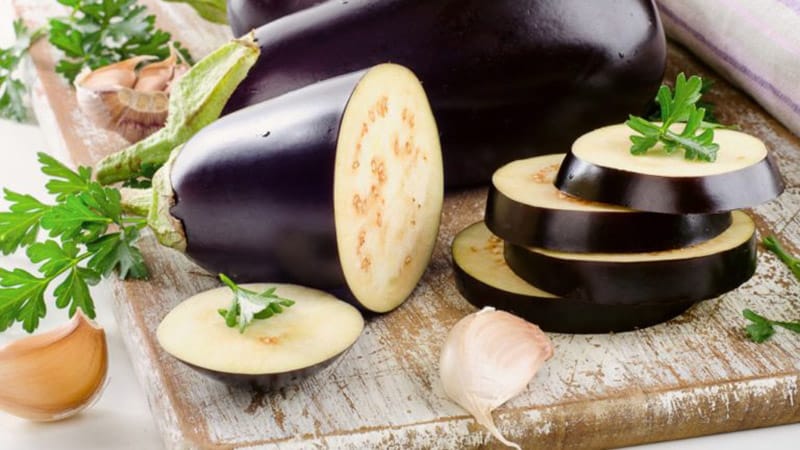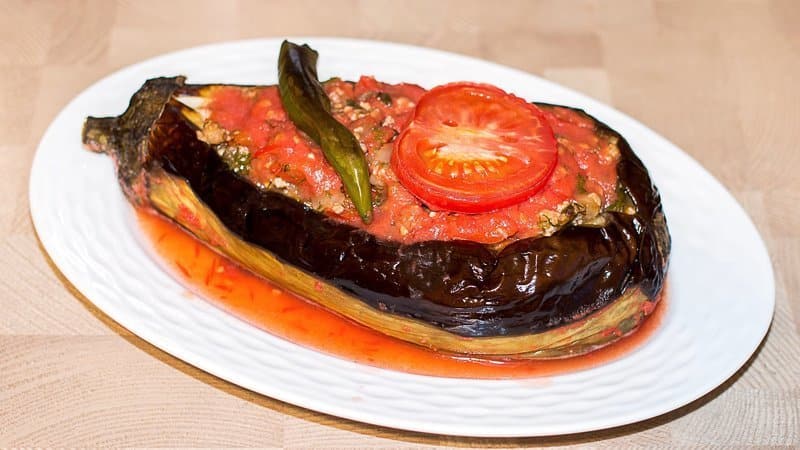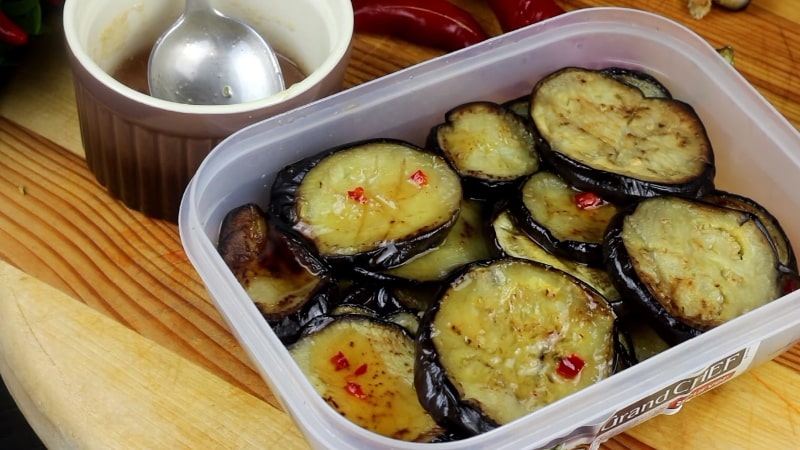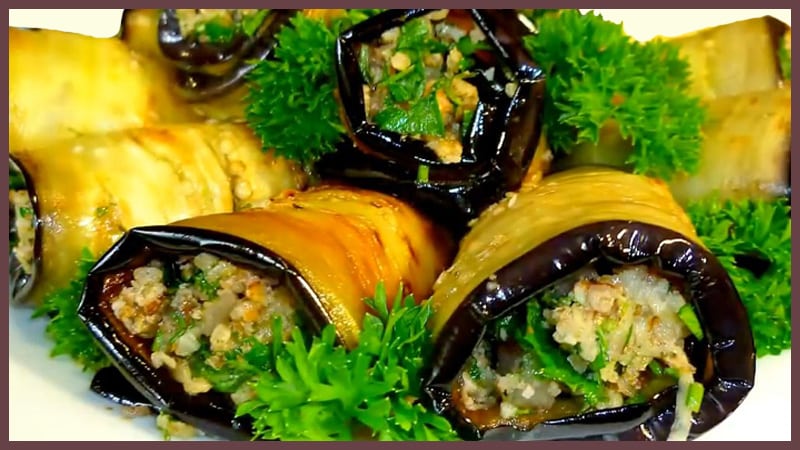Is it possible to eat eggplants for gout: arguments for and against, suitable recipes and consumption rates
Gout is a chronic disease caused by the deposition of uric acid salts in the joints and kidneys. It develops due to a violation of purine metabolism: the synthesis of uric acid increases and at the same time its excretion in the urine decreases. Urate microcrystals accumulate in the joint cavities, causing inflammation and kidney damage.
Treatment of gout is complex and requires mandatory adherence to the principles of proper nutrition. Limit the intake of purines and fats into the body, which interfere with the excretion of uric acid by the kidneys. Alkalinizing foods, such as eggplant, are introduced into the diet.
In the article we will consider whether it is possible to eat eggplants with gout or not, their benefits and harms, contraindications, chemical composition and energy value, cooking methods, recipes.
Can you eat eggplant if you have gout?

Eggplant, prepared using a gentle cooking method, is included in the list of permitted foods for gout. However, the vegetable is not always equally healthy. In order not to cause harm to health, it should be eaten in the absence of contraindications, in moderation, in combination with permitted foods.
For reference. Other names for eggplant are blue, bubrijan, badridzhan, dark-fruited nightshade.
Points for and against
Eggplants have a beneficial effect on the body as a whole. In case of gout, they restore, correct and maintain the acid-base balance, activate metabolism, regulate salt balance, and suppress the inflammatory process.
Blue ones have diuretic properties: they increase the formation and accelerate the excretion of urine along with crystals of uric acid salts. As a result of a decrease in the concentration of uric acid, pain and inflammation disappear, swelling subsides, recovery occurs faster, and the risk of repeated relapses, chronic pathology, and kidney damage decreases.
It is impossible not to note the usefulness of mineral salts for gout. The calcium in eggplant increases bone density. It also ensures normal transmission of nerve impulses, adequate blood clotting, and contraction of smooth skeletal muscles. Calcium reduces the likelihood of developing an inflammatory process, increases the body's resistance to various infections, which is especially important for gout of the infectious-allergic type.
Eggplants for gout can worsen the course of the underlying disease if the patient has other pathologies. It is recommended to limit or completely exclude fruits if the functions of the liver and kidneys are impaired. Peptic ulcer of the stomach and/or duodenum during an exacerbation also requires avoiding vegetables. Eggplant contains acids that irritate the mucous membrane; they can provoke a new attack of pain or increase the pain syndrome.
Nutritionists do not recommend including eggplants in your diet before July. To speed up the growth and ripening of vegetables, nitrogen fertilizers are added to the soil, which can be harmful to the human body.
Eggplants during an exacerbation of gout
Diet for gout in the acute period requires especially careful formation of the diet. The nutrition program prohibits the consumption of fish and meat products and fats. The diet includes liquid porridge with water, milk and vegetable soups, fermented milk products, herbal teas, fruit juices, decoctions of fruits or vegetables. Between meals, increased consumption of alkaline mineral water is indicated.
Eggplants in moderation and with proper cooking without the use of oil can be consumed during an exacerbation of gout. Since the diet in the acute period is physiologically inferior, the vegetable satisfies the body’s needs for calcium, potassium, magnesium, sodium, silicon, zinc, iron, ascorbic and folic acids, carotene, and fiber.
For reference. You cannot combine eggplants with prohibited foods - meat or fish, or use salt to improve the taste.
In chronic form

For chronic gout, eggplant should be present in the daily diet. It can be baked, boiled, stewed, steamed. The main thing is to eat more vegetables, raw or cooked, low-calorie fermented milk products, and vegetable oils. Limit or exclude fatty meats, fish, and other foods rich in oxalic acid and purine bases.
The benefits and harms of eggplants
The diverse chemical composition of eggplants improves the condition and functionality of the heart, blood vessels, nervous, urinary and digestive systems, which has a beneficial effect on the general condition of gout.
Main functions of eggplant:
- being a powerful antioxidant, it protects liver cell membranes from damage, and the body from premature aging;
- strengthens the walls of blood vessels, increases their elasticity, reduces the risk of atherosclerosis, myocardial infarction, stroke;
- normalizes cerebral circulation;
- stabilizes blood pressure;
- reduces cholesterol in the blood;
- activates metabolism;
- removes waste and toxins from the body;
- provides long-term and quick satiety, which reduces the volume of portions, eliminates the need for snacks, and reduces weight;
- important for bone health, prevents the risk of osteoporosis;
- stimulates the production of gastric juice;
- enhances intestinal motility;
- responsible for the proper functioning of the gastrointestinal tract;
- inhibits the activity of inflammatory phenomena;
- removes uric acid salts from joints;
- neutralizes swelling;
- strengthens the immune system;
- has antibacterial properties.
The harm of eggplants to the body is associated with their consumption in large quantities or against the background of contraindications. In people with gastritis, blue stomach and duodenal ulcers can worsen your overall health, provoke a new relapse, and increase pain. Eggplants can cause allergies, which are manifested by peeling, itching, skin rashes, lacrimation, and Quincke's edema.
Vegetables grown with pesticides or overripe fruits pose a health threat. In case of intoxication of the body, vomiting, nausea, dizziness, abdominal pain are observed, fainting, and mental disorders are possible.
Chemical composition
In addition to proteins, fats and carbohydrates, fruits contain:
- water (92%);
- glucose, sucrose, fructose;
- pectin;
- ash;
- phytosterols;
- amino acids: glycine, tryptophan, alanine, aspartic acid, serine, proline;
- ascorbic, pantothenic, folic acids;
- fatty acids: stearic, palmetic, oleic, linoleic, linolenic, omega-3 and omega-6;
- beta-carotene;
- retinol;
- thiamine (vitamin B1);
- riboflavin (vitamin B2);
- choline (vitamin B4);
- pyridoxine (vitamin B6);
- vitamin E;
- vitamin K;
- vitamin PP.
Of the mineral salts found in the composition: calcium, potassium, magnesium, sodium, phosphorus, iron, copper, manganese, zinc, selenium.
KBZHU
The energy value of raw eggplant is 25 kcal. It contains practically no fat (0.1 g), but is saturated with carbohydrates (2.9 g) and proteins (1 g). The nutritional value of eggplant with a gentle cooking method remains virtually unchanged.
Boiled vegetable without salt contains: protein 0.8 g, fat 0.2 g, carbohydrates 6.2 g, calorie content - 35 kcal.
Usage guidelines for gout
The consumption rates of eggplant for gout depend on the stage of the disease, the severity of symptoms, the age of the patient, the presence of concomitant diseases and, most importantly, other foods in the diet.
 Therapeutic nutrition involves reducing the energy value of the diet, reducing body weight, limiting fats and purines. The average vegetable intake for an adult is 200-300 g as an independent product, 100-200 g as an ingredient in other vegetable dishes.
Therapeutic nutrition involves reducing the energy value of the diet, reducing body weight, limiting fats and purines. The average vegetable intake for an adult is 200-300 g as an independent product, 100-200 g as an ingredient in other vegetable dishes.
Advice. Don't overuse eggplant. Its composition, although in small quantities (8 g per 100 g of product), contains purine substances, the accumulation of which underlies the development of gout.
What is the best form to eat eggplant for gout?
Eggplants for gout will not harm the body, provided they are subjected to gentle heat treatment. They are boiled, baked in the oven/grill, steamed, stewed.
Often the fruits are processed into juice, which is superior in usefulness cooked fruits. To do this, you need to wash the eggplants, remove the stems, and remove the peel. Grind in a blender or using a grater. Pour the pulp into gauze folded in several layers and squeeze out the juice. Take 70-100 ml three times a day before meals.
There are many dietary eggplant recipes. Below we will look at how to prepare rolls, eggplant casserole, and vegetable salad.
Eggplant salad
Ingredients:
- eggplants - 1 pc.;
- fresh cucumber - 2 pcs.;
- bran - 1 tbsp. l;
- lettuce leaves;
- olive oil (you can use any other flaxseed, sesame, pumpkin, grape seed oil) - 1 tbsp.
Recipe:
- Wash the eggplant, remove the peel, cut into cubes, and bake in the oven until done.
- Peel the cucumber and cut into strips.
- Place lettuce leaves on a dish, top with all the vegetables and bran, drizzle with olive oil, and mix. The salad should sit for 15-20 minutes.
Eggplant casserole
Products:
- eggplants - 2 pcs.;
- tomatoes - 2 pcs.;
- Mozzarella cheese - 150 g;
- greens, dried herbs;
- vegetable oil - 1 tbsp. l.
How to cook:
- Soak the vegetables for an hour in salted water. Wash, peel, cut into slices.
- Wash the tomatoes and also cut into slices. Grate the cheese on a medium grater.
- Grease a baking dish with vegetable oil, overlap the vegetables, alternating tomatoes with eggplants, add herbs on top, a little salt, then cover with cheese.
- Bake in a preheated oven at 200 degrees for 20 minutes. 5 minutes before readiness, season with finely chopped herbs.
Eggplant rolls
Ingredients:
- eggplants - 2 pcs.;
- tomatoes - 1 pc.;
- sour cream 15% fat or yogurt without additives - 1 tbsp. l;
- cheese with low fat content - 100 g;
- garlic - 1 clove.
Recipe:
- Cut off the stems of the eggplants and cut them lengthwise into several plates 10-15 mm thick.
- Line a baking dish with parchment, lay out the eggplants, bake for 15-20 minutes until done at a temperature of 180-200°C.
- Cut the tomatoes into slices.
- Grate the cheese on a fine grater, squeeze out the garlic, season everything with yogurt, mix.
- Spread the cooled blue ones with cheese and garlic filling, add a slice of tomato, if desired, a sprig of parsley, roll it up and secure with a skewer.

Contraindications
Eggplants are strictly contraindicated in case of individual intolerance to one or more components of the composition. It is recommended to limit their use or completely exclude them from the diet during acute inflammation of the pancreas, during exacerbation of gastritis, gastric and duodenal ulcers, and during the formation of medium and large salt stones in the kidneys.
Important. The usefulness of eggplants for people with arthritis of different localizations, low concentration of iron in the blood and other diseases should be determined by a doctor.
Precautionary measures
To get the maximum benefit from the vegetable, it is recommended to eat the fruits of your own harvest, grown without the use of nitrates. If this condition cannot be met, it is important to know how to buy the “right” eggplant. Choose oblong-shaped fruits with blue-black shiny skin, without signs of spoilage, firm to the touch, the stem is fresh and green, the skin is smooth and not wrinkled.
You should not eat overripe eggplants - they contain an increased concentration of the toxic compound solanine. Solanine poisoning is manifested by nausea, vomiting, and abdominal pain.In severe cases, mental disorders, convulsions, and coma are observed. If any adverse reactions occur, contact a medical facility immediately.
Advice. To remove bitterness, soak eggplants for an hour in cold salted water. Then the remaining salt is thoroughly washed off with clean water, and you can start cooking.
Nutritionists recommend consuming the vegetable systematically, but in small portions, and preparing it using a gentle cooking method. You should not buy eggplants outside the natural ripening season. To prolong the shelf life of the product, it is better to freeze it. In this form, eggplant is stored for 12 months and practically does not lose its beneficial properties.
Read also:
How to properly dry eggplants for the winter at home: 3 best ways.
A productive and early ripening variety of eggplant "Bourgeois".
Conclusion
Most patients underestimate the importance of proper nutrition for gout. It is important to properly organize your daily diet and exclude foods high in purines from it.
It is recommended to consume alkalizing foods, such as eggplant. These measures slow down the progression of the disease, prevent the formation of gouty nodes and kidney damage, and preserve the function of the musculoskeletal system as much as possible.